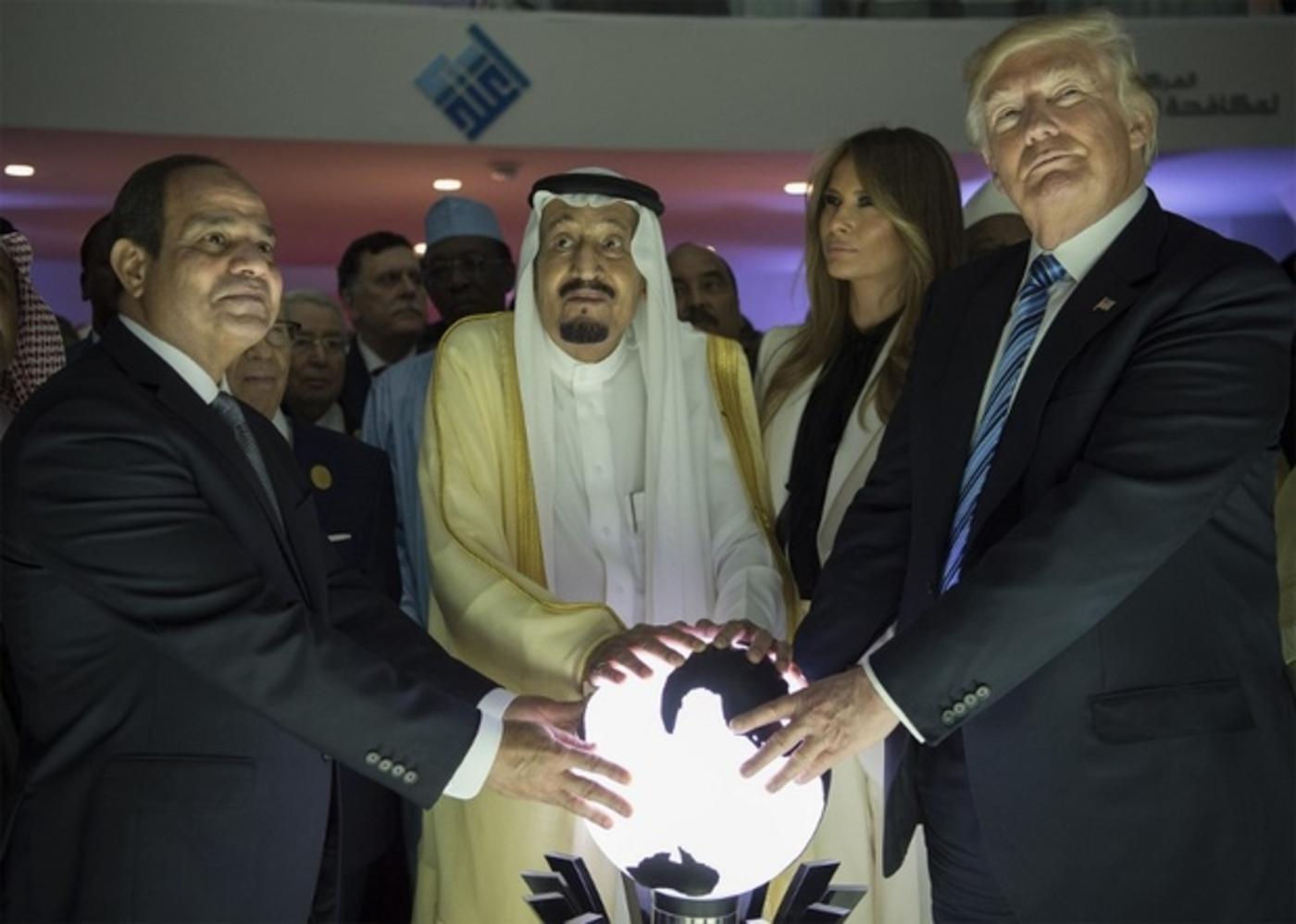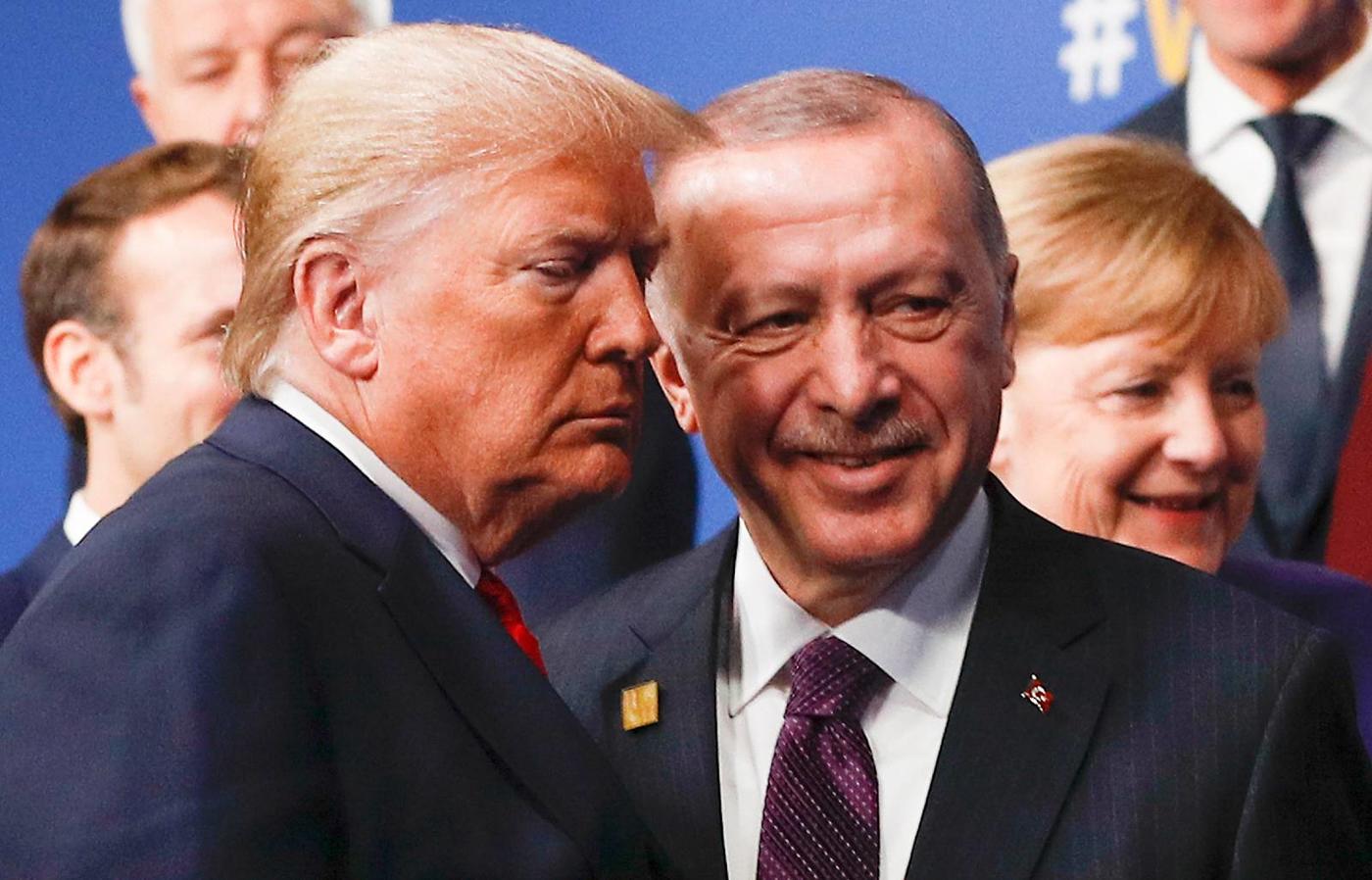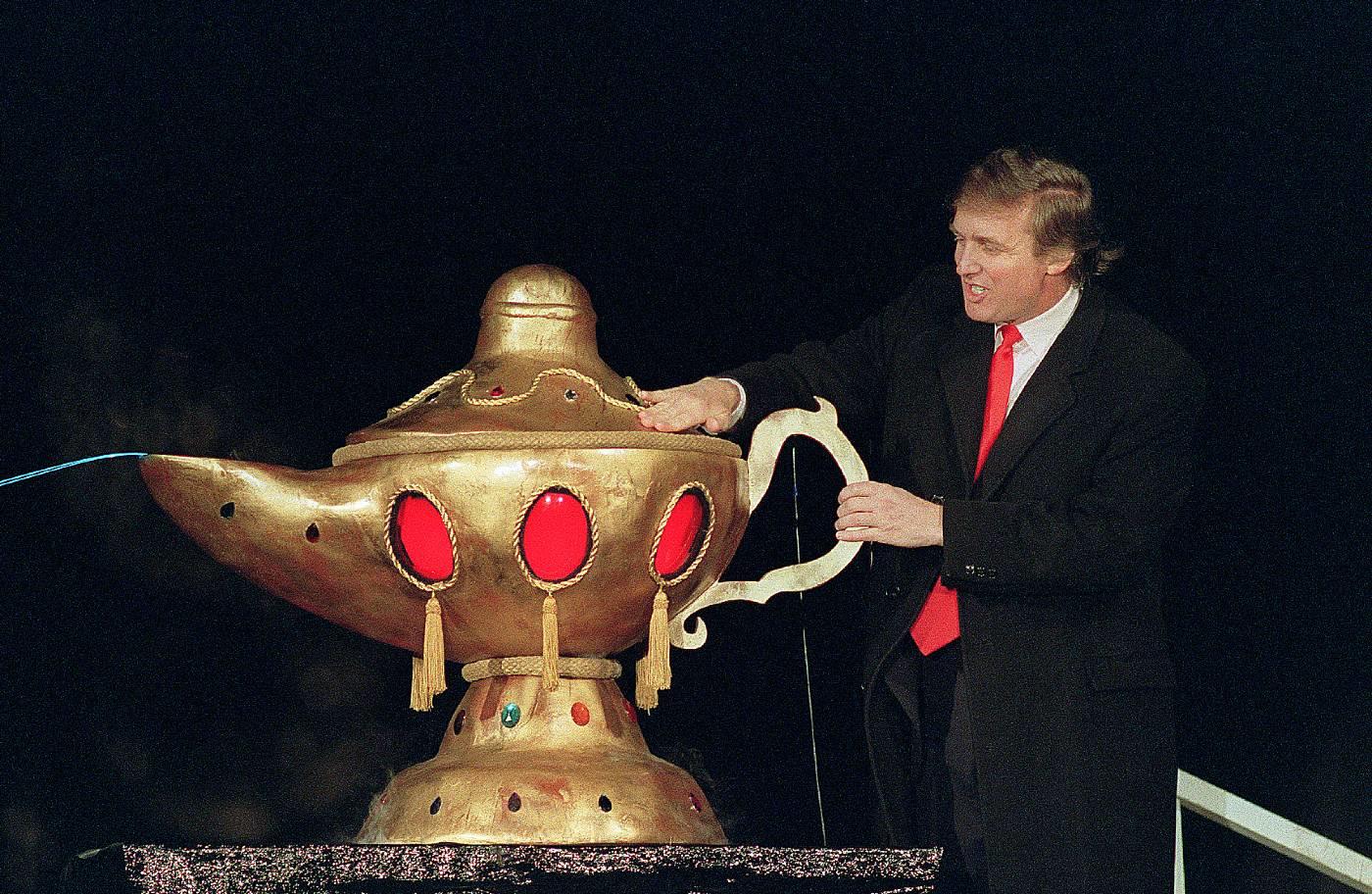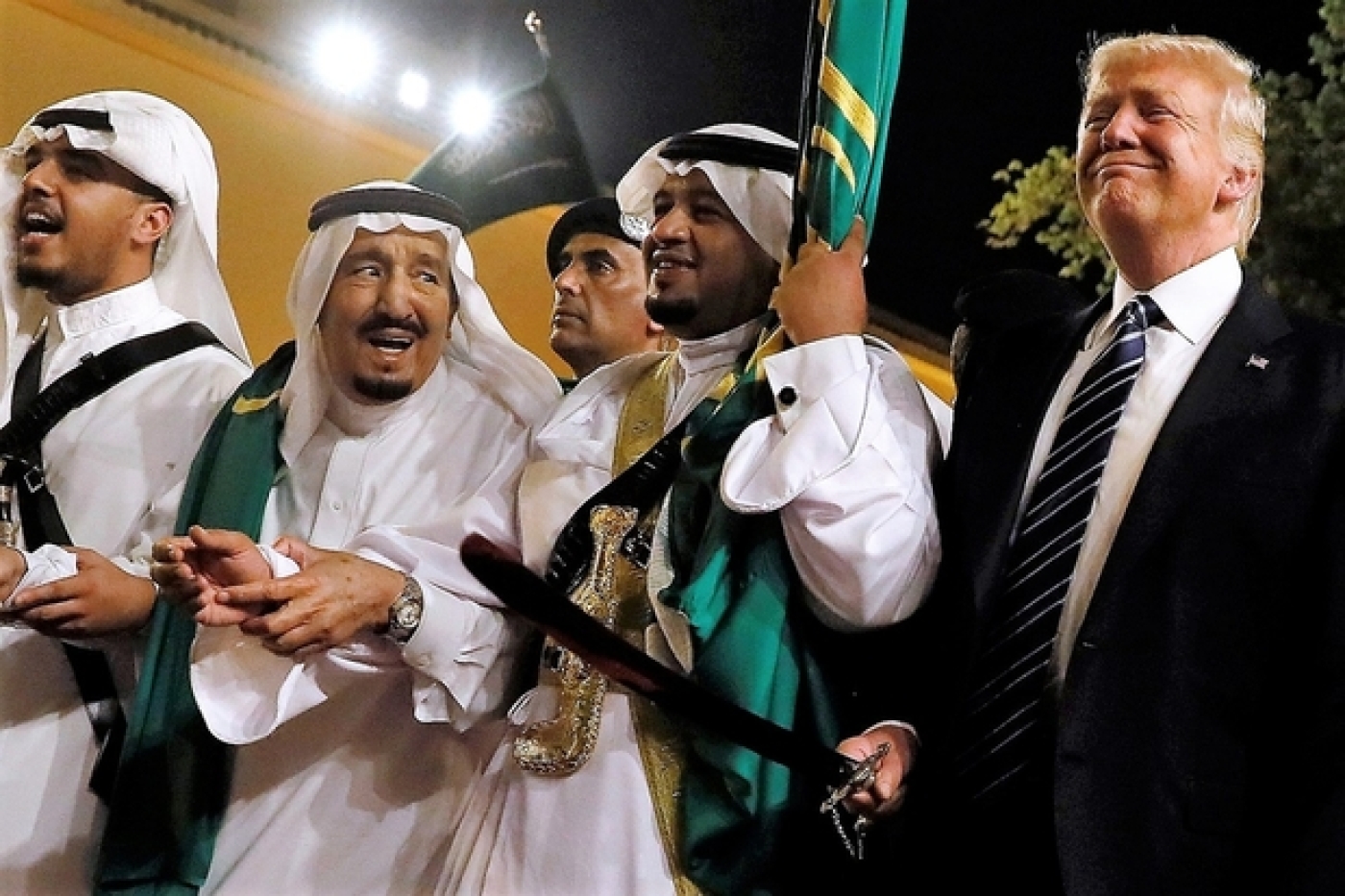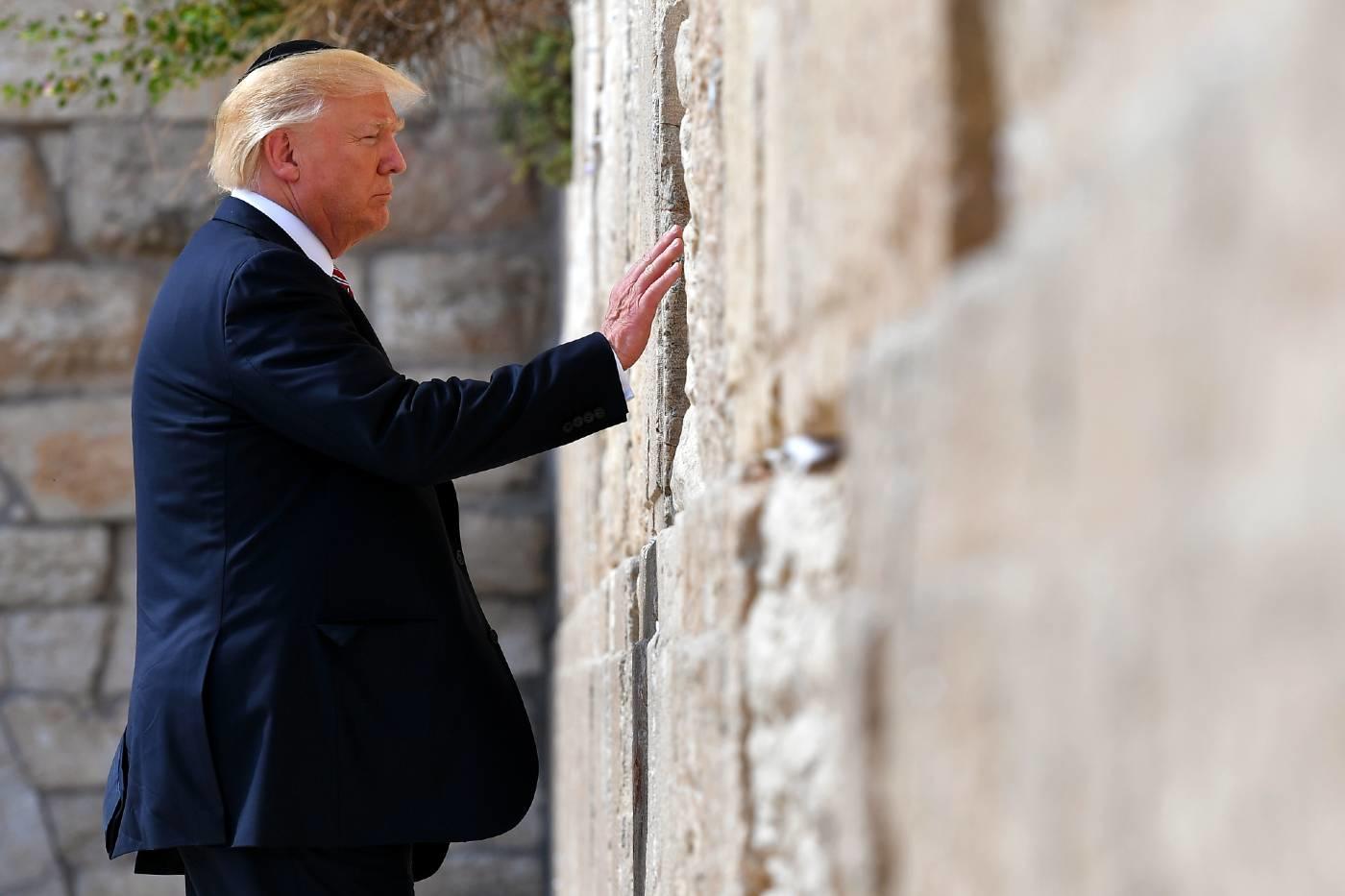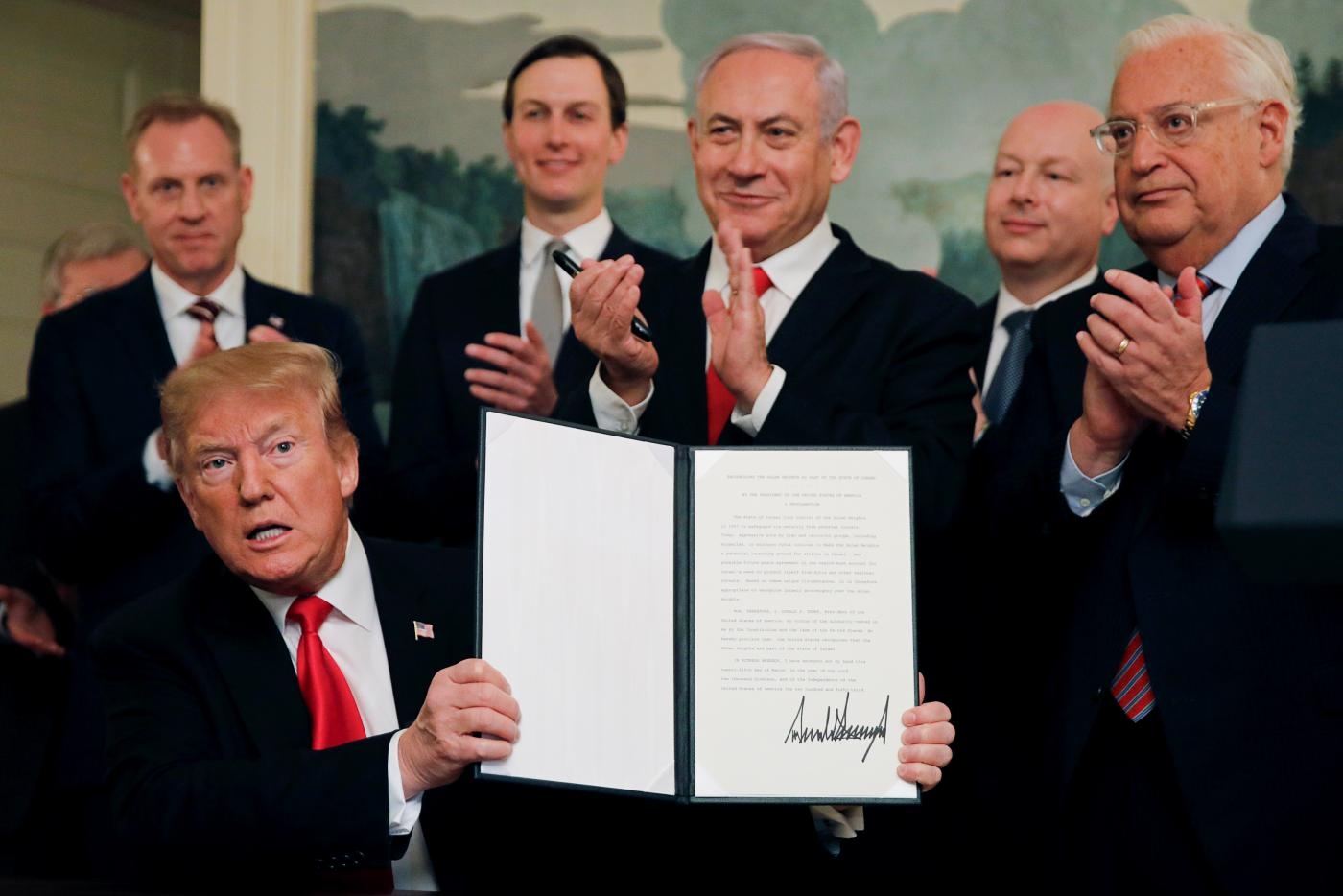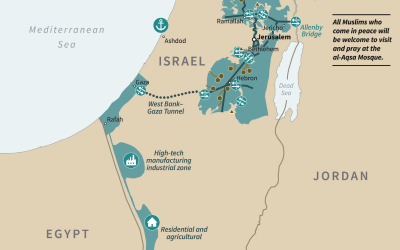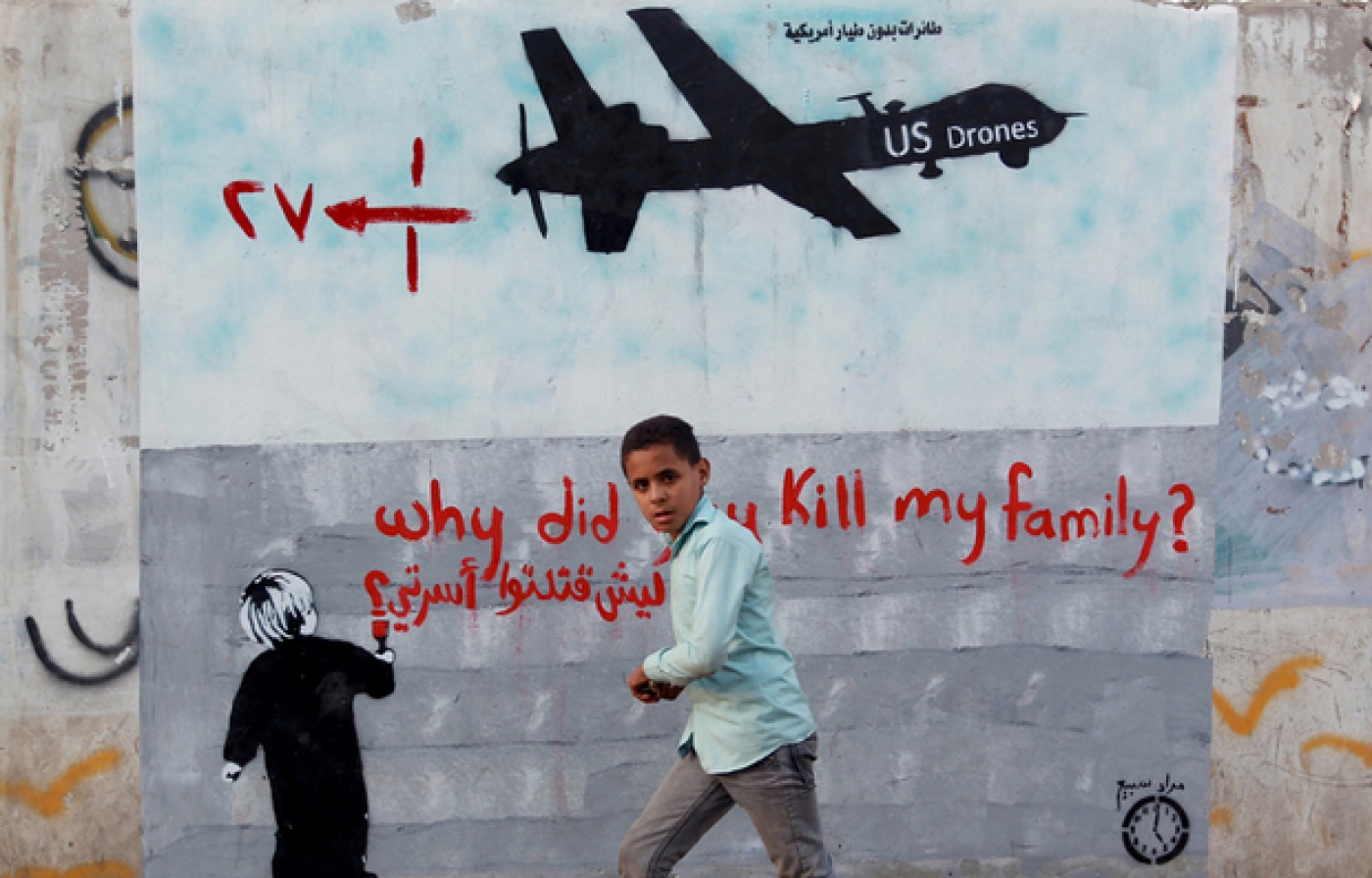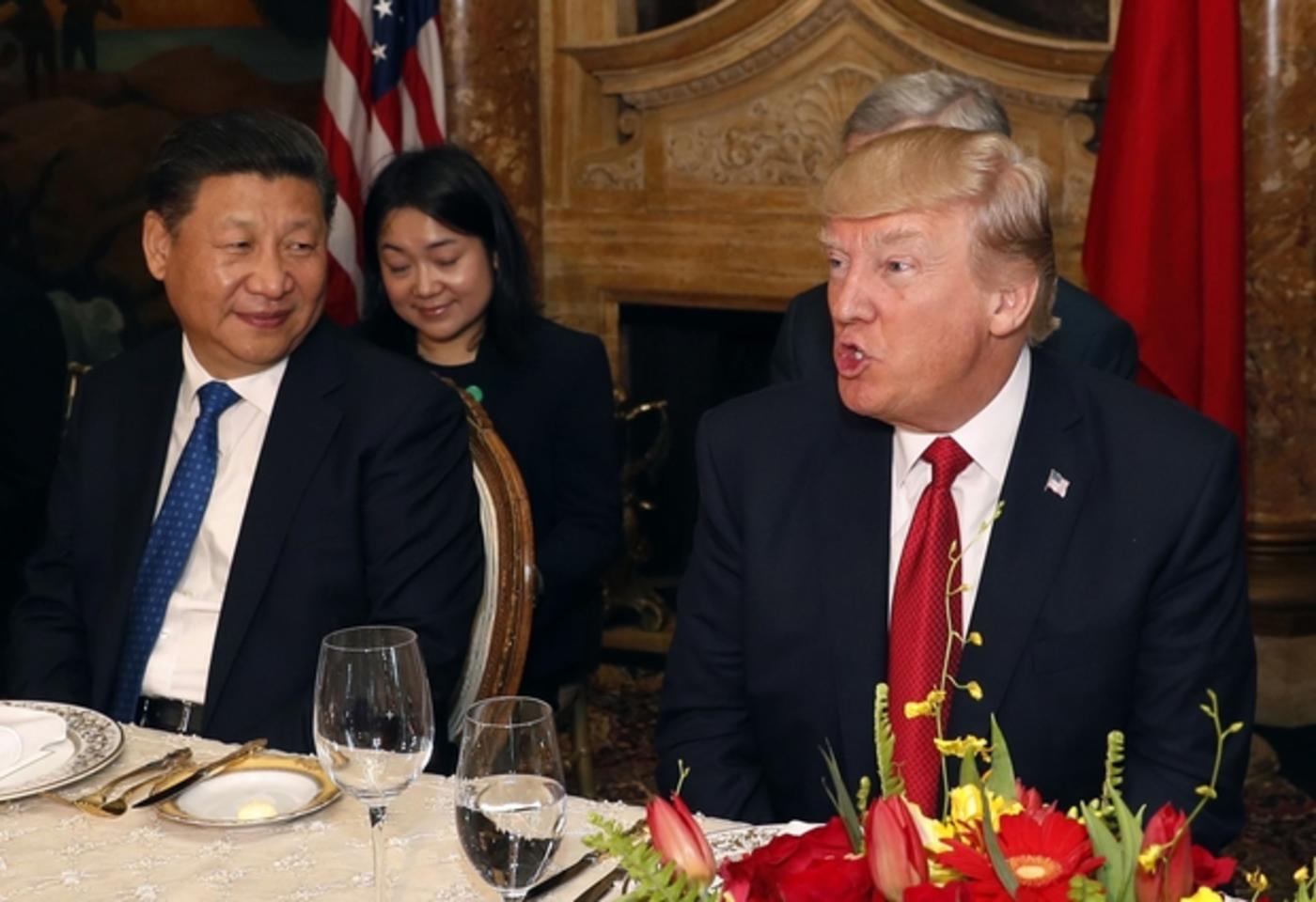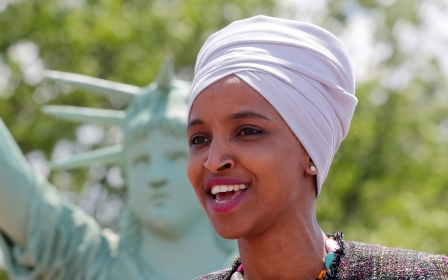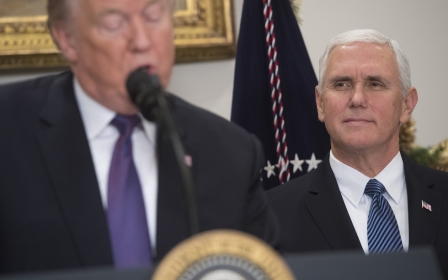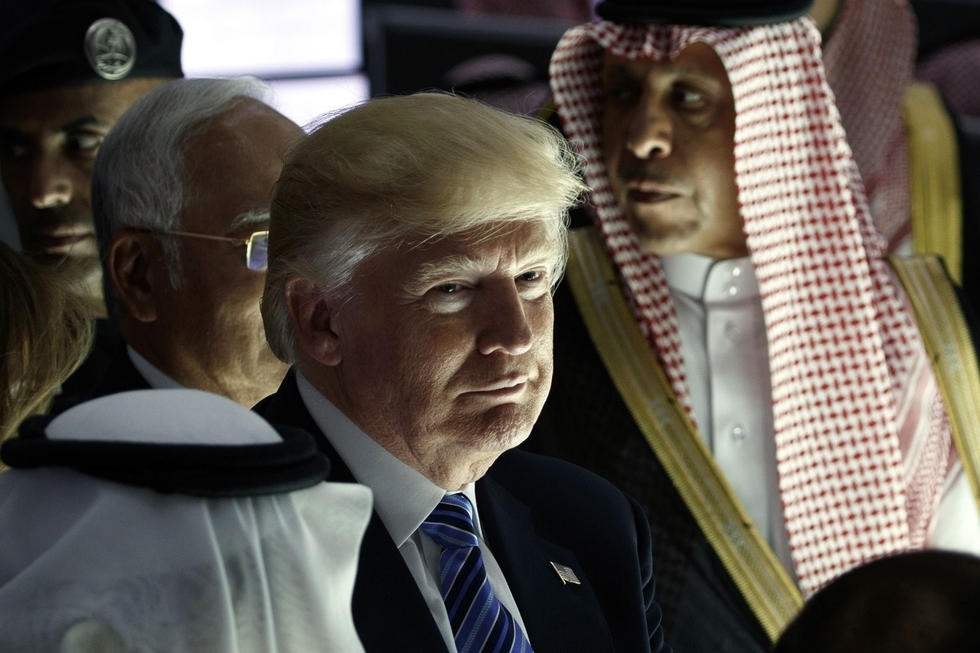
Donald Trump in the Middle East: A story of big winners and bigger losers
On Sunday 21 May 2017, four months after he was inaugurated as US president, Donald Trump entered a darkened room at the Global Centre for Combating Extremist Ideology, in Riyadh, Saudi Arabia. There, Trump, with his wife Melania looking on, stood alongside his host King Salman and Egyptian President Abdel Fattah el-Sisi, placed his hands on a glowing orb mounted atop a pedestal, then looked out at the assembled media.
The photo of this moment, tweeted by the Saudi embassy in the United States, captured the global imagination. Here was the new leader of what was still the world's most powerful country, in a chamber full of computers, surrounded by darkness and accompanied by two strongmen of the Middle East, appearing to draw some kind of ungodly power from a mysterious spheroid.
Opening this centre for "combating extremist ideology," the new president heralded a "clear declaration that Muslim-majority countries must take the lead in combating radicalisation, and I want to express our gratitude to King Salman for this strong demonstration of leadership".
There were two Trump fixations lurking behind this statement: a belief that, as he put it in March 2016, "Islam hates us"; and a conviction that it was high time that America's allies did the work they had previously outsourced to the US.
Domestically, the Islamophobic nature of his administration had been confirmed in Trump's first week of office, with the signing of Executive Order 13769, commonly known as the "Muslim ban," which suspended entry to the US from a slew of Muslim-majority countries. Before becoming president, Trump said in November 2015 that he would "certainly implement" a database to track Muslims in the US, and had expressed agreement with a supporter at a 2015 rally in New Hampshire who told him, "We have a problem in this country; it's called Muslims."
The glowing orb was a prop. But this was Trump's first foreign trip: everything was laden with symbolism
In Riyadh, it turned out the glowing orb was just a translucent globe – nothing more than a prop. But this was Trump's first foreign trip - and everything was laden with symbolism.
Beginning in Saudi Arabia, he later went on to Israel, where he descended from the plane to a red carpet and Israeli Prime Minister Benjamin Netanyahu, who clasped him by the arm and repeated the line: "Welcome my good friend." Trump later visited the Western Wall, becoming the first sitting US president to do so. He told a press conference that it was time Iran stopped their "deadly funding" of "terrorists and militias".
These moments turned out to be significant. They are worth consideration now that Trump will be replaced as president by Joe Biden, his Democrat opponent.
Trump and the ties that bind
At the time of writing, this transition looks unlikely to be smooth. Congress is set to be controlled by the Democrats, while the Senate will likely be held by the Republicans. The next US administration may not find itself with much room for manoeuvre. Trump - and Trumpism - have not been given the shellacking many liberals hoped for. Both the man and the ideology are here to stay, with the deep divisions the US faces domestically impacting on its flailing performance abroad.
The foreign policy positions taken by the White House during the last four years may not easily be undone. It is also worth noting that Biden, the embodiment of a Democratic establishment that saw the systemic change offered by Bernie Sanders as just as dangerous as Trump, may have no real desire to undo them.
Those positions have been most steadfast when it comes to Saudi Arabia and Israel. During Trump's time in office, these two allies - already lavishly assisted by Washington - have received more diplomatic and political support from the US than any other states. This backing has existed alongside the personal championing of Netanyahu and Mohammed bin Salman, the self-proclaimed modernising crown prince of Saudi Arabia, who has been directly linked to a number of human rights abuses, including the killing of journalist Jamal Khashoggi.
That championing is reciprocated, and if there is anything that has defined a seemingly erratic American foreign policy under this president, then it is Trump's mercantile fondness for strongmen he can do business with; leaders and nations whose ravenous self-interest makes cutting a deal possible.
More significantly, the president has been akin to a puppet or useful idiot for a series of foreign policy advisers, whose views were previously deemed extreme even by Washington's standards, a leader often led by whoever is talking loudly in his ear. Trump would tire of these advisers after a while (or they would tire of him). Then they would leave the White House to write a book about what an idiot their boss was, usually laundering their reputation in the process.
Hostility towards Iran, aggressive championing of Israel, a selective interest in democracy, and a fondness for absolute rulers you could do business with have always been features of US foreign policy. But as with so many things during the Trump presidency, those features were distorted into their most severe form, with the usual victims – Palestinians, leftists, democracy advocates, Muslims – in a far worse position at the end of his term than they were four years ago.
Trump's road to the White House
For decades before he became president, Trump was a famous man who liked the sound of his own voice. This was compounded by the nature of his celebrity, which meant he was often asked about whether he was going to run for president, as well as his views on this or that policy.
It is probably fair to say that before he became US president in 2017, this son of a New York real estate millionaire, who spent as much time in front of the camera as he could, had never given much thought to the question of peace in the Middle East.
But it's also true that here was a man with a set of very distinct feelings and prejudices, who viewed life as a struggle for dominance and who valued the art of the deal above all else.
When it came to the world at large, a common theme Trump returned to during his decades as a real estate celebrity and reality TV star was that countries which enjoyed some form of US military protection were not paying their way, that they were leeches and that American political leaders were being taken for suckers.
It's a theme that continued into his campaign to become president and which has been present particularly in his stance towards Nato, whose fellow members he believes are subsidised by the US.
In September 1987, Trump took out full-page adverts - branded "an open letter from Donald J Trump" - in several major American newspapers. "Make Japan, Saudi Arabia, and others pay for the protection we extend as allies," said the advert, which cost Trump $94,801. In TV interviews, he added Kuwait to the list. Trump urged the US to "tax these wealthy nations," relieving itself of the "cost of defending those who can easily afford to pay us for the defence of their freedom".
Trump is known to be over-sensitive. The open letter concluded: "Let's not let our great country be laughed at anymore."
Saudi Arabia: Money matters
By the time Donald J Trump hit the presidential campaign trail in 2015, his stance on Saudi Arabia appeared to have changed. While countries like Germany and other members of the North Atlantic alliance were still deemed freeloaders, the Gulf kingdom was a well from which to drink deeply. "Saudi Arabia - and I get along great with all of them," he said at one of his rallies in 2015. "They buy apartments from me. They spend $40 million, $50 million. Am I supposed to dislike them? I like them very much."
In essence, this approach to Saudi Arabia changed little once Trump became president. On that first foreign trip as US leader, he and his family delighted at being ferried around in gold golf carts, and attending a $75m party thrown in his honour, complete with a throne for him to sit on. For a man whose main residence in Manhattan is a palace of brass and chintz, situated in a tower bearing his own name, Trump was at home in the Gulf.
With his son-in-law and adviser Jared Kushner hitting it off with Mohammed bin Salman, who was made crown prince in June 2017 and became the kingdom's de facto leader, Trump doubled down on an alliance that had been slowly weakening since the turn of the 21st century.
Barack Obama, Trump's predecessor, had told the Saudis to stop amplifying "external threats" and signed the nuclear deal with Iran. Trump pulled out of the deal in May 2018.
Influenced by a string of virulently anti-Iranian advisers from Michael Flynn to Jim Mattis (who reportedly referred to the "idiot raghead mullahs" ruling the Islamic Republic) to Mike Pompeo to John Bolton, who had made regime change in Iran his life's work, Trump amplified the threat from Tehran, imposing crippling sanctions, sending troops to the Persian Gulf and, in January 2020, ordering the killing of top Iranian general Qassem Soleimani.
The assassination of Saudi journalist Jamal Khashoggi in October 2018, which the CIA eventually linked back to bin Salman, provoked bi-partisan outrage in Washington. Trump was called on to take action against the errant crown prince: none was taken. "I saved his ass," the president said of MBS in January 2020, according to Bob Woodward. "I was able to get Congress to leave him alone. I was able to get them to stop."
While Trump, and particularly Kushner, clearly liked MBS personally, the real reason for their support was money, and the president's mercantile view of the world. The Saudi crown prince promised investment and he promised more money for American weapons.
In March 2018, five months before Khashoggi's murder, bin Salman sat next to Trump in the Oval Office while the president held up a chart that read, "12.5 billion in finalised sales to Saudi Arabia," illustrated by pictures of US arms bought by the kingdom.
At a press conference in Japan in June 2019, eight months after the assassination of the Saudi journalist, Trump referred to bin Salman as "a great friend of mine," a man who had "done things in the last five years in terms of opening up Saudi Arabia... especially for women". What was happening in the Gulf kingdom was, Trump said, "like a revolution in a very positive way". Asked more than once about Khashoggi, Trump dodged the question.
A couple of months earlier, in April 2019, Trump had vetoed a bipartisan resolution to end American military involvement in Saudi Arabia's war in Yemen.
Israel: Moving ever further to the right
The president's support for Israel's right-wing, led by Netanyahu, has, if anything, been more extreme than that for Saudi Arabia. On the campaign trail in March 2016, Trump told CNN that he was "very pro-Israel," boasting about the donations he had made to the country and the awards he had received there.
His business interests in Israel prior to becoming president seemed to amount to not much more than a planned Trump Tower and a brand of vodka that was somewhat popular with the ultra-Orthodox community at Passover but deemed undrinkable by almost everyone else.
As for the Palestinians, Trump said that he would "love to be neutral," but that it was hard because they were inflicting too much terror. "They have to stop with the terror because what they're doing with the missiles and with the stabbings and with all of the other things they do, it's horrible and it's got to end," he said in March 2016, repeating a view that is hardly uncommon among many Americans, namely that Palestinians are defined by their "terrorism".
It's worth noting that, at this early stage, there were plenty of American commentators who deemed even this kind of rhetoric not sufficiently pro-Israel, with one CNN pundit noting Trump's "unusually objective language on Israel" and pointing out that at that time, the Republican candidate had "initially dodged a question on the possibility of moving the US embassy from Tel Aviv to Jerusalem".
As for the Palestinians, Trump said that he would 'love to be neutral,' but that it was hard because they were inflicting too much terror
The wind was only blowing in one direction though. Sheldon Adelson, a strident Zionist whose longstanding dream was to see the embassy move to Jerusalem, eventually put tens of millions of dollars into Trump's 2016 campaign (he put even more into the 2020 one). It was clear that the Republican nominee would most likely take a strongly pro-Israeli position should he become president.
Always a man comforted by the presence of familiar faces, Trump's Middle East policy was defined by his son-in-law Jared Kushner and by two former Trump Organisation employees: the bankruptcy lawyer David Friedman and the real estate lawyer Jason Greenblatt.
Friedman, who became the US ambassador to Israel, was a supporter and donor to illegal settlements on occupied Palestinian land. The son of a conservative rabbi, he had helped raise about $2m in tax-deductible donations each year from supporters of the settlement movement - including the Kushner family - through an organisation called American Friends of Beit El Institutions.
Greenblatt, who had worked for Trump since 1997, was catapulted into the role of special representative for international negotiations, becoming one of the chief architects of Trump's Middle East peace plan - the so-called "deal of the century," which was rejected unanimously by the Palestinians. An advocate for illegal West Bank settlements, in November 2016 Greenblatt declared that they were "not an obstacle to peace," and that he preferred them to be referred to as "neighbourhoods".
With Kushner also a family friend of Netanyahu's, the odds were stacked heavily against the Palestinians: a 2017 Trump administration document stated that "Israel is not the cause of the region's problems" and that "jihadist terrorist organisations" were the only thing standing in the way of peace.
In October 2019, Trump broadened his regular attacks on Somalia-born Congresswoman Ilhan Omar, an "America-hating socialist," into a general broadside at the Somali community in Minnesota, telling a rally that he would "give local communities a greater say in refugee policy and put in place enhanced vetting and responsible immigration controls". In March 2019, a gunman who cited Trump as "a symbol of renewed white identity and common purpose" killed 51 people at mosques in Christchurch, New Zealand.
The 2017 national security document was followed by a slew of moves in support of Netanyahu and Israel's nationalist right-wing. In February of that year, the US dropped its longstanding commitment to a two-state solution after Trump met with Netanyahu. In December 2017, Washington announced that it would move its embassy in Israel to Jerusalem.
When the move came in May 2018, Adelson, who had offered to fund it, wept tears of joy: on that same day, more than 60 Palestinians were killed by Israeli forces in a single day (some later died from their injuries) as they protested their right to return to ancestral homes.
This was four months after the Trump White House announced that it was cutting half its planned funding to UNRWA, the UN agency for Palestinian refugees. Before the year was out, the rest of the funding had been cut as well, as the US declared the agency an "irredeemably flawed operation".
The Middle East at its worst
When it was released in January 2020, Trump's Middle East peace plan was even worse than his many detractors had feared.
It accepted Israeli calls to annex the Jordan Valley and Israeli settlements in the occupied West Bank. It called for Jerusalem to become Israel's undivided capital. It said that a Palestinian state could only happen when the Palestinian leadership wholly accepted Israel's new borders, disarmed completely, removed Hamas from power in Gaza and agreed to Israeli security oversight across all of its territories until a point in the future deemed ripe for withdrawal. There was much more, none of it good for the Palestinians, who unanimously rejected the deal.
This plan for peace was then followed by normalisation agreements between Israel and the UAE, then between Israel and Bahrain. Sudan, crippled by US sanctions for years, has had its revolution rewarded by having a gun stuck to its head: sign a normalisation deal with Israel or else stay on the US terrorist list. It chose the former, to much crowing from Trump and Kushner.
Other Arab nations may well follow: Kushner was quick to celebrate how he and his father-in-law broke down the decades-long solidarity between those nations when it came to Palestine.
Once, there was no peace with Israel without some justice for Palestine. That accord has been bludgeoned to the ground by a new regional order headed by Netanyahu and the Gulf kingdoms of Saudi Arabia and the UAE, from where Crown Prince Mohammed bin Zayed wields considerable influence over both Trump and Mohammed bin Salman.
In Egypt, President Abdel Fattah el-Sisi, another strongman, has been dubbed a "killer" by Trump.
This is a word used by the president both literally and as a mark of business acumen: tough dealmakers are, in the president's language, "killers". Sisi fits the bill for both and has also been referred to by Trump as his "favourite dictator".
More recently, the US president suggested that Egypt could "blow up" the Ethiopian-built Nile Renaissance Dam that is causing enormous tensions between the two large African US allies. While Obama ended up tacitly removing support for Egypt's Hosni Mubarak, Trump has actively championed Sisi, whose appalling record on human rights has gone virtually unacknowledged.
Elsewhere in the Middle East and North Africa, it was interesting for those of us who covered the real estate mogul's campaign first for the Republican nomination, then for president, to take note of what he did once he was in office.
Back in 2016, the foreign policy community was fixated with Trump's perceived isolationism. At rally after rally, he claimed to have opposed the Iraq war - in fact, he only did so explicitly a year after the invasion – and talked of bringing US troops home.
While it has to be acknowledged that Trump has certainly gone some way to making good on these promises by withdrawing thousands of troops from Afghanistan, Iraq and Syria, thousands more remain out in the field.
Civilian deaths have skyrocketed. The US drone strikes which escalated under Obama further escalated under Trump. In March 2019, the Republican president revoked a policy, introduced by his predecessor, requiring that intelligence officials publish the number of civilians killed in drone strikes outside of war zones.
During the past four years, Washington has ceded geopolitical control in parts of Syria to Russia. Iran's influence in Iraq has grown at its expense. But Trump's position has been far from isolationist, however erratic it has been.
US troops remain in northeastern Syria, where there is a longstanding military engagement with the Islamic State (IS) group, whose leader, Abu Bakr al-Baghdadi, was killed by the US in October 2019, a big win for Trump. Washington is unlikely to give up its base at al-Tanf in the Homs governorate any time soon, however useless it may be.
US sanctions against Syria appear to be hurting its population much more than its ruler, Bashar al-Assad, and his cronies. The removal of US military support from its Kurdish allies, long anticipated in the Autonomous Administration of North and East Syria, also known as Rojava, has nevertheless been a huge betrayal, even if American involvement was always seen by most citizens there as self-interested and likely to expire.
In April 2017, Trump responded to a chemical weapons attack by the Syrian government with an air strike, which he ordered just after he sat down to dinner with Chinese President Xi Jinping at his mansion in Mar-a-Lago, Florida. The US president reportedly ordered the attack after his daughter Ivanka showed him pictures of Syrian children affected by the chemical raid, a scene Steve Bannon described as "disgusting".
Trump was responding emotionally, perhaps, but it was also a show of strength before a meeting with Xi: China has since taken the place of the Soviet Union in a new Cold War cooked up by the White House.
Donald Trump's time as president ends with many of America's worst tendencies as global hegemon severely exacerbated and a few of its better ones more or less abandoned. Trump went at the question of Israel and Palestine with the scattershot enthusiasm of the showy dealmaker he is, eventually resulting in the darkest of Palestinian nightmares.
Uninterested in working but interested in being flattered and pampered, scornful of sincerely held beliefs but in thrall to power and money, Trump showed the world what America is at its worst: a place of desperate injustice, ruled by a wealthy few.
In bringing the US close to war with Iran, humiliating the Palestinians, having no coherent plan in Syria or Iraq and in championing murderous autocrats in the Gulf and North Africa, this US president and his administration has left the region in dreadful straits.
Oscar Rickett is a journalist who has written and worked for Middle East Eye, VICE, The Guardian, BBC, Channel 4, openDemocracy, Africa Confidential and various others.
The views expressed in this article belong to the author and do not necessarily reflect the editorial policy of Middle East Eye.
Photo: President Donald Trump listens during a ceremony to mark the opening of the Global Center for Combatting Extremist Ideology, Sunday, May 21, 2017, in Riyadh (AP)
This article is available in French on Middle East Eye French edition.
Middle East Eye propose une couverture et une analyse indépendantes et incomparables du Moyen-Orient, de l’Afrique du Nord et d’autres régions du monde. Pour en savoir plus sur la reprise de ce contenu et les frais qui s’appliquent, veuillez remplir ce formulaire [en anglais]. Pour en savoir plus sur MEE, cliquez ici [en anglais].


